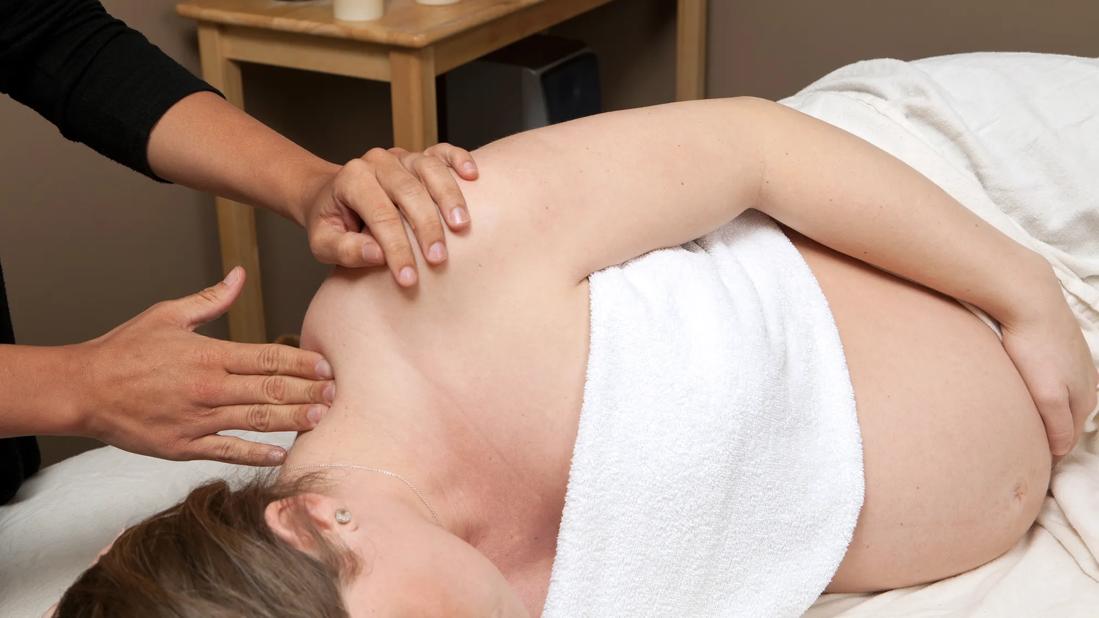Prenatal massage, done properly, is a safe and effective way to lower stress and relieve pregnancy discomforts

A good massage is like hitting the trifecta of self-care: It can reduce stress, relieve aches and pains, and feel like the ultimate indulgence.
Advertisement
Cleveland Clinic is a non-profit academic medical center. Advertising on our site helps support our mission. We do not endorse non-Cleveland Clinic products or services. Policy
And when you’re pregnant, the benefits of a prenatal massage can be amplified even more.
Licensed massage therapist DeBorah Hill, RN, LMT, explains what to expect from a prenatal massage, what to avoid and what it can do for you.
Prenatal massage is a self-care and complementary medicine practice that can help relieve the emotional and physical discomforts of pregnancy.
Prenatal massage allows you to get all those feel-good benefits of massage in a pregnancy-safe practice. That can include massage techniques like:
“Prenatal massage is all about using very gentle massage techniques that are effective with pain relief and discomfort,” Hill says.
In a lot of ways, a prenatal massage is much like a traditional therapeutic massage, but with a few pregnancy-safe modifications.
“A prenatal massage is generally going to use very light pressure — no more than firm to medium pressure,” Hill explains.
In other words, don’t expect the kind of deep tissue massage used to release tough knots. “Prenatal massage shouldn’t cause any discomfort. We’re not looking to dig in deep,” she adds.
Also, unlike a traditional massage, prenatal massages are typically done while you lie on your side. Some pregnancy-specific props can help keep you comfortable and make sure your body is properly aligned. That can include things like pillows and firm cushions (bolsters) to help keep you comfortable.
Advertisement
Prenatal massages generally last anywhere from 15 minutes to an hour. As with other massage practices, you can be as covered (or as bare) as you choose.
“During a prenatal massage, you’re covered by sheets and a blanket,” Hill further explains. “Some people completely undress. Others prefer to wear pregnancy drapes (sheets and blankets) because they’re more movable. Some people prefer to stay in their undergarments. Whatever is comfortable to you should be OK with your provider.”
Hill says most pregnancy providers usually recommend waiting until the beginning of the second trimester (12 weeks pregnant and beyond) to get a prenatal massage.
“Waiting until you’re out of your first trimester is advisable,” Hill says. “Limiting or avoiding massage during early pregnancy when miscarriage rates are highest is considered the safest route.”
Once your pregnancy is into the second trimester, the more massages the merrier.
Hill recommends getting a massage once every two weeks for maximum benefit. As you hit the end of the third trimester and the discomforts add up, you can get a massage up to once a week.
Prenatal massage can be soothing, and it can also offer multiple health benefits. A review of research suggests it may help:
“Whether you’re pregnant or not, getting a massage may decrease stress hormones and spur production of oxytocin,” Hill reports. “Oxytocin is known to help improve labor contractions and influence your bonding with your baby.”
The risks of prenatal massage from a licensed massage therapist are minimal for most healthy pregnancies, especially after the first trimester.
To ensure your safety and promote a healthy pregnancy, your therapist should follow these safety guidelines:
Advertisement
If you’re cleared by your healthcare provider, choose a reputable massage therapist who’s trained to provide prenatal massage. And get ready to enjoy the perks of some you-time.
“During pregnancy, so many things are limited — from foods and drinks to activities you enjoy and even certain medications,” Hill recognizes. “Prenatal massages are something you can do to help yourself feel your best.”
Advertisement

Sign up for our Health Essentials emails for expert guidance on nutrition, fitness, sleep, skin care and more.
Learn more about our editorial process.
Advertisement

Most rashes aren’t dangerous — but it’s worth talking to your pregnancy provider about them

The best available evidence indicates that, used correctly, acetaminophen is safe to take throughout a pregnancy

Avoid high-mercury fish and processed meat, and go easy on salt and caffeine

Unless your healthcare provider tells you otherwise, it’s typically considered safe to have sex during pregnancy

Baths can be safe if you turn down the temp, avoid irritating bath products and take extra precautions against

SSRIs are the safest antidepressants to take in pregnancy — and pose less risk than unmanaged depression

Progesterone during pregnancy can cause clear, white or pale yellow discharge

Your peak reproductive years tend to fall between your late teens and your late 20s

Even small moments of time outdoors can help reduce stress, boost mood and restore a sense of calm

A correct prescription helps your eyes see clearly — but as natural changes occur, you may need stronger or different eyeglasses

Both are medical emergencies, but they are very distinct events with different causes